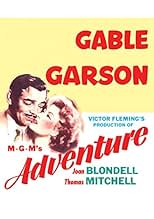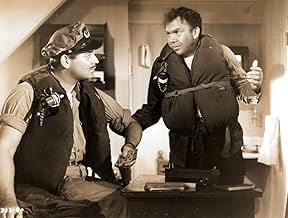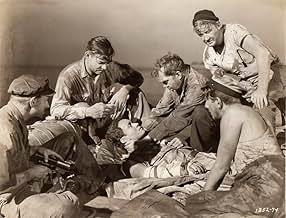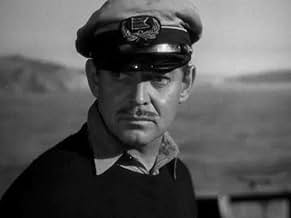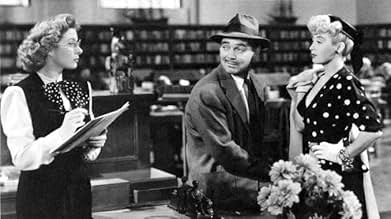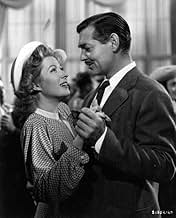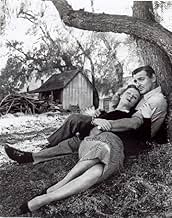NOTE IMDb
6,1/10
1,3 k
MA NOTE
Ajouter une intrigue dans votre langueDark, romantic, complicated drama about a rowdy merchant mariner and sophisticated librarian who clash over their lifestyles and values - and then fall in love.Dark, romantic, complicated drama about a rowdy merchant mariner and sophisticated librarian who clash over their lifestyles and values - and then fall in love.Dark, romantic, complicated drama about a rowdy merchant mariner and sophisticated librarian who clash over their lifestyles and values - and then fall in love.
- Réalisation
- Scénario
- Casting principal
- Récompenses
- 2 victoires au total
Stanley Andrews
- Bit Part
- (non confirmé)
Florence Auer
- Landlady
- (non confirmé)
Pedro de Cordoba
- Felipe
- (non confirmé)
Rex Ingram
- Preacher
- (non confirmé)
Garry Owen
- Jabbo
- (non confirmé)
Harry Wilson
- Big Mug
- (non confirmé)
Richard Abbott
- Clerk
- (non crédité)
Avis à la une
I'm giving this movie 6 stars for the sheer pleasure of looking at Greer Garson, one of my favorites.
But I'd put this movie alongside "Remember?" as the weakest Garson films. For me, the problem was Clark Gable.
Gable is given the kind of typical "rough guy the dames falls for" role that made him a star...a combination of bluster and charm that won over Jean Harlow or Myrna Loy or Claudette Colbert.
Here, I think it's too much bluster and too little charm to realistically connect with Garson in the role she's given.
One pleasure here is seeing Joan Blondell -- she did lots of good work after the '30s musicals that she's best remembered for.
Also good: Thomas Mitchell.
Overall: see it once for the novelty of it, or skip it altogether,
But I'd put this movie alongside "Remember?" as the weakest Garson films. For me, the problem was Clark Gable.
Gable is given the kind of typical "rough guy the dames falls for" role that made him a star...a combination of bluster and charm that won over Jean Harlow or Myrna Loy or Claudette Colbert.
Here, I think it's too much bluster and too little charm to realistically connect with Garson in the role she's given.
One pleasure here is seeing Joan Blondell -- she did lots of good work after the '30s musicals that she's best remembered for.
Also good: Thomas Mitchell.
Overall: see it once for the novelty of it, or skip it altogether,
"Adventure" is an oddly generic title for such a singularly unique motion picture. Its superficial values are appealing enough--the Gable bluster is rarely put to such good use, and Garson is possibly the only actress with enough mettle to match him--but these attributes are hardly unusual and neither, indeed, is the storyline. What makes the effort favorably surprising is the story's aspiration to allegory through the use of poetics, which may occasionally seem overt but which never fail to ring true. It's an ambitious undertaking, and it works.
In its time, the movie was dismissed for being both formulaic and even crude, which in itself betrays either an ignorance of its higher aspirations or, more likely, a reluctance to take them seriously. America in 1945 prided itself on street smarts and industrial might; on its not being taken for a sucker. It had saved Europe from the axis forces and was about to embark on a socioeconomic boom such as the world had never seen: It wasn't interested in philosophical musings about the nature of the soul. The idea that these musings could be given dimension in a simple and often predictable story about a rakish sailor and a repressed librarian drove reviewers to pronounce the script "foolish" and the poetic commentary "gibberish."
But it is these very elements, this oddly ardent coloring, that have somehow deepened and mellowed with time, and which now provide the film with the kind of rich, subtle flavor found in only the most treasured vintages. More unique still is that the movie is less interested in the sentimentality of its story than in the metaphysical questions it poses. Its chief accomplishment is in avoiding any academic exploration of such questions (a choice which parallels the arc of the story itself), and it does so by illustrating with large, colorful brushes. Only the intelligence of the director and the skill of his actors keep the proceedings from veering off into caricature, a tipping point that when straddled with such finesse is delightful viewing indeed.
In its time, the movie was dismissed for being both formulaic and even crude, which in itself betrays either an ignorance of its higher aspirations or, more likely, a reluctance to take them seriously. America in 1945 prided itself on street smarts and industrial might; on its not being taken for a sucker. It had saved Europe from the axis forces and was about to embark on a socioeconomic boom such as the world had never seen: It wasn't interested in philosophical musings about the nature of the soul. The idea that these musings could be given dimension in a simple and often predictable story about a rakish sailor and a repressed librarian drove reviewers to pronounce the script "foolish" and the poetic commentary "gibberish."
But it is these very elements, this oddly ardent coloring, that have somehow deepened and mellowed with time, and which now provide the film with the kind of rich, subtle flavor found in only the most treasured vintages. More unique still is that the movie is less interested in the sentimentality of its story than in the metaphysical questions it poses. Its chief accomplishment is in avoiding any academic exploration of such questions (a choice which parallels the arc of the story itself), and it does so by illustrating with large, colorful brushes. Only the intelligence of the director and the skill of his actors keep the proceedings from veering off into caricature, a tipping point that when straddled with such finesse is delightful viewing indeed.
I'm 65 and I have appreciated Gable's contributions over his career. I did not see Adventure on the silver screen but only this afternoon on TV, and so I cannot think back to how it was received at the time. Our mindsets are different now, anyway, and so I'm now wondering whether anyone else today besides me becomes worn down by his dialog? I'm sorry, but his constant barking finally got to me and I had to turn this one off. What's he doing anyway, schtik? I can imagine his answering even "one lump or two?" in high dudgeon. That just gets tiresome after a while, until such affectation of anger, indignation, resentment or whatever degenerates almost into buffoonery. Not everything has to be expressed frankly, my dear.
You have to see the movie to learn what "it" refers to. You will also learn how to lure chickens properly, how to regain your "soul", what San Fran looked like in 1945, how to attract a woman by dating her roommate, how to throw rocks at your lover, how snappy dialogue and lively acting can be much more entertaining than the 90% of the c**p in today's "subtle" acting movies. No "adventure" here in today's terms but quite daring and emotional in its own way.
Gable and Garson make for a poor pairing in this overlong limp love story that goes in circles for over two hours. Gable fresh from war service looks like he's aged considerably and his tired abrasive performance shows it.
Harry Patterson (Gable) has a girl in every port and plans never to get tied down. Wandering into a library with a shipmate friend he meets staid and proper librarian Emily Sears (Garson) who is at first put off by the lug but opposites are known to attract and they ending up running off to Reno and getting hitched. But Harry's no land lubber and the two split up but not before Emily gets knocked-up. An oblivious Harry goes back to sea and his old ways but it just ain't the same.
There is little finesse to be found in Gables performance, just bluster. He does a lot of jabbering and doesn't really connect with anyone in the film. Garson's Emily on the other hand is too delicate and restrained to do a one-eighty. Victor Fleming's direction is loose and uninspired and the production values erratic with some terrible back projection.
"Gable's back and Garson's got'em" went the phrase back then but after seeing this you can keep them.
Harry Patterson (Gable) has a girl in every port and plans never to get tied down. Wandering into a library with a shipmate friend he meets staid and proper librarian Emily Sears (Garson) who is at first put off by the lug but opposites are known to attract and they ending up running off to Reno and getting hitched. But Harry's no land lubber and the two split up but not before Emily gets knocked-up. An oblivious Harry goes back to sea and his old ways but it just ain't the same.
There is little finesse to be found in Gables performance, just bluster. He does a lot of jabbering and doesn't really connect with anyone in the film. Garson's Emily on the other hand is too delicate and restrained to do a one-eighty. Victor Fleming's direction is loose and uninspired and the production values erratic with some terrible back projection.
"Gable's back and Garson's got'em" went the phrase back then but after seeing this you can keep them.
Le saviez-vous
- AnecdotesAny reports of this film's financial failure are false. Variety (January 8, 1947) listed it as the #7 box office hit of 1946. (It was released December 28, 1945.) The film earned more than $6M worldwide and earned a profit for MGM.
- GaffesWhen the Buckleys drive away from Emily's house in the country, a clear reflection of the boom microphone can be seen on the right rear passenger window and other areas of the highly-polished car as it drives off.
- Citations
Harry Patterson: There ain't a dame I can't forget in six months.
- ConnexionsFeatured in Clark Gable: Tall, Dark and Handsome (1996)
- Bandes originalesDown in the Valley
(a.k.a. "Birmingham Jail")(uncredited)
Meilleurs choix
Connectez-vous pour évaluer et suivre la liste de favoris afin de recevoir des recommandations personnalisées
- How long is Adventure?Alimenté par Alexa
Détails
Box-office
- Budget
- 3 500 000 $US (estimé)
- Durée
- 2h 5min(125 min)
- Couleur
- Rapport de forme
- 1.37 : 1
Contribuer à cette page
Suggérer une modification ou ajouter du contenu manquant

